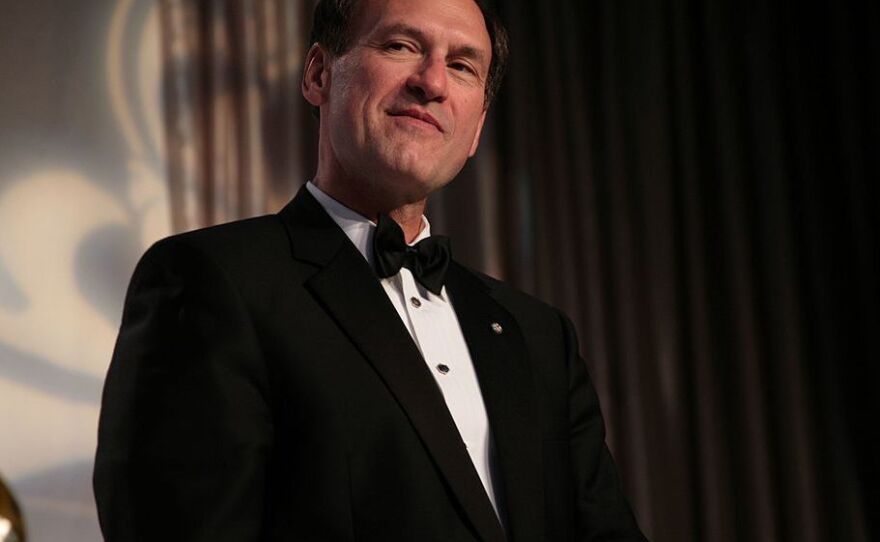In the history of the U.S. Supreme Court, the names of just a few justices are linked with a single very famous--or infamous--decision. Chief Justice John Marshall for his 1803 decision declaring that the courts have the power to strike down laws that violate the constitution; Chief Justice Roger Taney for the infamous decision in the Dred Scott case, declaring that no African American, enslaved or free, could be a citizen of the United states, a decision that led in part to the Civil War; Chief Justice Earl Warren for his 1954 decision declaring segregation in public schools unconstitutional. And now, the name of Samuel Alito is indelibly linked with the court's opinion overturning a half century's worth of decisions declaring that women have a right to abortion.
Alito, unlike Marshall, Taney and Warren, is not chief justice, and he may be little known to the public generally. But he has played a key role on the court, often leading the conservative charge not just on abortion, but for expanded religious rights, against LGBTQ rights, against expanded voting rights, against labor unions, for the death penalty, and more.
The workhorse of the right
Indeed, within a short time of replacing the more moderate Justice Sandra Day O'Connor in 2006, he became something of the workhorse of the right.
On contraception, for instance, he wrote the court's 5-to-4 decision, declaring that closely held, for-profit corporations could refuse, on religious grounds, to comply with a federal law that required employer insurance policies to cover contraception for their employees.
"This court has said time and again that we have no business judging whether any sincere religious belief is valid or reasonable and it would be dangerous if we started down that road," he said in announcing his opinion from the bench in 2014.
He wrote the court's 2010 decision striking down state bans on handguns in the home, declaring the "right to keep and bear arms is implicit in our understanding of ordered liberty and is deeply rooted in the traditions of our country."
He wrote the court's 2007 decision declaring that victims of race and sex discrimination on the job could only recover damages dating back 180 days after filing suit, as opposed to when the discrimination began. Congress promptly rebuked the court, amending the anti-discrimination statute to make clear that damages and back pay are to be paid from the date the discrimination begins.
In death penalty cases, Alito has been impatient with attempts to limit capital punishment, in one case writing that any death row inmate who challenges the state's execution method as cruel and unusual punishment, must now come up with an alternative method.
In voting rights cases, he has repeatedly sided with state laws that make it more difficult for people to vote. As he wrote in a 2021 opinion, "Mere inconvenience cannot be enough to demonstrate a violation" of the Voting Rights Act.
One special Alito crusade focused on public employee labor unions. In particular, he took aim at a 40-year-old Supreme Court decision that upheld the rights of unions to collect fees from non-union members, as long as the fees were used only for collective bargaining and other non-political activities that benefitted all workers, union and non-union alike. The idea was to prevent non-union workers from being "free-riders" on the backs of the union. But in 2018, Alito, after whittling away at the precedent for more than a decade, even repeatedly inviting challenges, finally managed to overturn it. The First Amendment right of free speech, he said, includes the right not to speak or support a union in any way. "Nonunion members are not free riders at all," he said. "They are captive riders."
The overturning of Roe
Few issues appear to rankle Alito as much as those that directly or indirectly involve religion, and perhaps not incidentally, the modern culture war. As he put it in a July speech, There is a "growing hostility to religion or at least the traditional religious beliefs that are contrary to the new moral code that is ascendant in some sectors."
The Dobbs decision overturning Roe was his exegesis on abortion and constitutional interpretation. There is no audio of his opinion announcement because the court conveniently abandoned the longtime tradition of these announcements at the height of the epidemic and thereafter, prompting an increasing wave of criticism.
But as Alito explained in his written abortion opinion, the Supreme Court's Roe decision and the decisions that followed, had to be overruled because Roe was "egregiously wrong," the arguments for it "exceptionally weak," and because there was no history or tradition of abortion at the time of the founding or thereafter. There was no evidence, said Alito, "zero," that supported such a right.
Many on the political right hailed the decision as "brilliant," and an example of Alito's approach to the law. "He is not a partisan," said one former Alito clerk. "He just believes that the law is based on rules and rules are rules, regardless of politics."
'He's able to succeed'
Liberal Yale law professor Akhil Amar defends Alito too, maintaining that the justice succeeds by staying within the lines and not overreaching. "He's quiet. He's able to succeed," says Amar.
But others, including some conservatives, disagree. Among them is Sarah Isgur, a former official in the Trump Justice Department, who at one time was a leading member of the conservative Federalist Society. She says the Alito opinion fails the critical test of persuasion because it speaks only to those who agree with him.
"When you have a court that is 6-3 on so many different types of opinions, you can end up with a feeling there there are permanent winners and losers," she says. "And the court when it writes, it needs to write more persuasively to the people who might feel like they're permanent losers."
The question, at this point, she adds, is not whether Roe was correctly decided, but, "Do you overturn a precedent that has been on the books for 50 years--the most famous case probably to most Americans in the country, and it's not even close."
Cornell Constitutional law professor Michael Dorf is more pointed, calling the opinion, "dishonest" because it "so selectively cites history" to argue just one side of a case.
"The judge is supposed to look at it from a more balanced perspective, and that's not what Justice Alito does," Dorf says. "One wonders how so many prior justices, a majority of whom were appointed by Republican presidents, could have found a right to abortion in the constitution and then reaffirmed that right. There's a kind of arrogance to the opinion in the way it proceeds in a one-sided manner."
Isgur adds that Alito's assurances ring hollow when he contends at the end of his opinion that the Dobbs case should not cast doubt on other precedents based on the same reasoning as Roe-- the same-sex marriage opinion, or opinions guaranteeing the right to access contraception, for instance.
That may be, but Alito is part of a court, that, as Chief Justice John Roberts observed in the Dobbs case, is displaying "a relentless freedom from doubt on legal issues."
Copyright 2023 NPR. To see more, visit https://www.npr.org. 9(MDAzMjM2NDYzMDEyMzc1Njk5NjAxNzY3OQ001))







